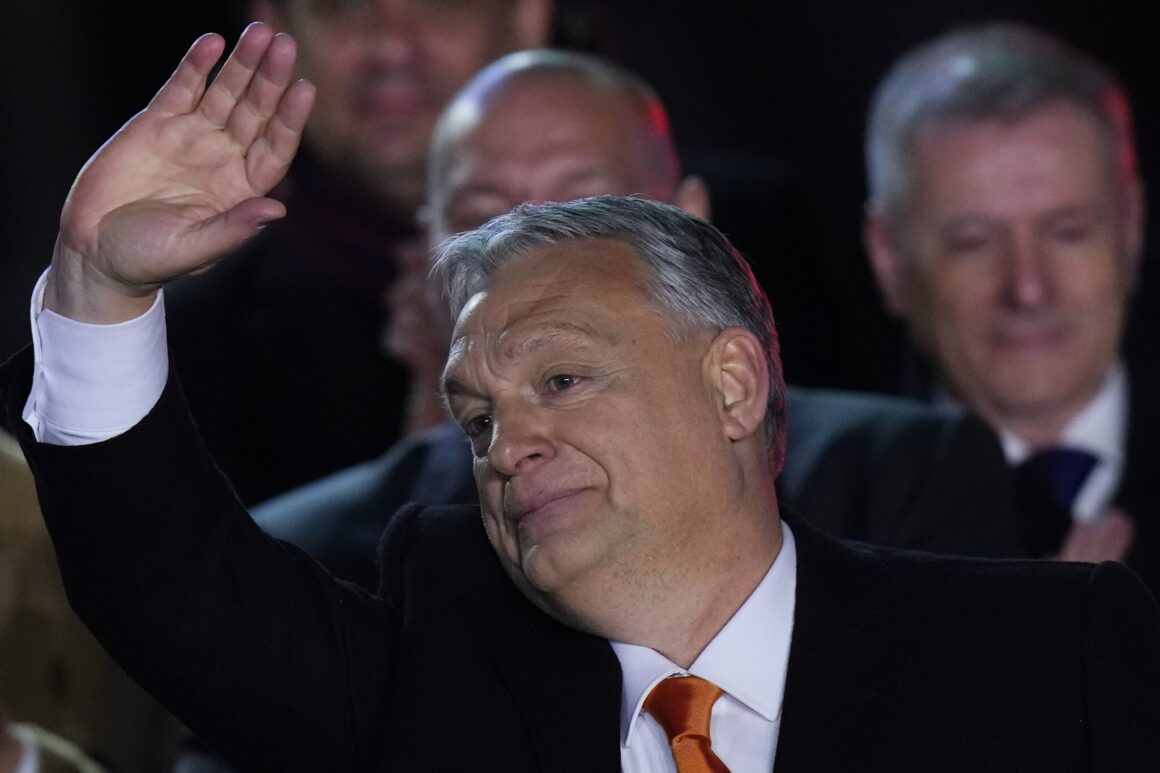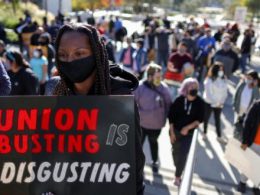By Till Ruster, Sozialistische LinksPartei (our sister organisation in Austria)
To state the obvious: in a country with a notoriously authoritarian head of government, who has been in power since 2010, no election campaign is “fair”, even by bourgeois standards.
The main opposition parties were given practically no access to the media, whether public or private. Orbàn has built a clique of Hungarian capitalists around himself, that is as dependent on him as he is on them. He makes them richer, they keep him in power. These “friends” bought up the independent media stations after Orbàn closed some of them down. So all that could be heard about the opposition in the media were government accusations against them.
Having passed a new constitution and introduced other voting rules, Orbàn has built the electoral system in such a way as to support the strongest party. Most parliamentary seats are directly elected by constituency, and are won by the strongest candidate, whether they have a 50% majority or not. In this way, as in some other countries, millions of votes do not count.
But even with these two advantages, Orbàn’s party “Fidèsz” was still not confident they would win. So they spent about ten times more in the election campaign than all other parties combined.
But it would be short-sighted to explain this success only as a result of manipulation, and not playing “fair”. Fidèsz still has significant support in the population, especially in the more rural areas. Orbàn was able to maintain this support even during the very difficult, recent period, when Covid and inflation made an already precarious social situation unbearable for many Hungarians. With so many people working in neighboring European countries, lockdowns often meant incomes may have been cut off completely.
Pro-Putin neutrality?
It could have been expected that the ongoing war in Ukraine might have made it difficult for the European far-right, which has always been very close to Putin. This is especially true for Orbàn, whose “illiberal democracy” is considered by many as a role model of the far-right in Europe. This closeness is not only political: Russia and China fund important infrastructure projects, such as the expansion of the most important nuclear plant in Hungary.
Fidèsz does not tire to picture itself as the party of the 1990 revolt against stalinism. Orbàn himself had his first public political appearance in 1989 when he famously demanded the withdrawal of the Soviet Army from Hungary during an opposition demo in Budapest. Every October he speaks at the national commemoration of the 1956 Uprising, talking of how Hungary to this day is besieged by foreign powers and needs to resist them as it did in ’56. Even though the situation was very different both in 1956, when the Kremlin sent in troops to put down a workers’ uprising against stalinism for democratic socialism and in 1990, there are similarities to the Russian aggression in Ukraine today.
But Orbàn managed to frame the situation differently during his election campaign. Amongst the powers that want to control Hungary, he explained, were not just Russia but the EU and NATO as well. The only solution, he said, was “neutrality” and looking out for Hungary first. Everyone who wants to drag Hungary deeper into this conflict is an enemy of the people. In his victory speech, he even called Zelensky an “enemy” because he supposedly tried to intervene in the elections on behalf of the pro-EU opposition.
This points to an ongoing conflict between Hungary and Ukraine about the Hungarian minority there. Orbàn regularly intervenes on their behalf, not only in Ukraine but in those neighboring countries that separated from the former “Greater Hungary” after World War 1, and is until today a point of reference and a target especially, but not only, for right-wing nationalist forces. In most of these countries, including in Ukraine, these minorities are actually discriminated against, albeit not by as much as Orbàn claims, while minorities such as the Roma people face discrimination in Hungary itself. So taking in 500.000 Ukrainian War refugees may look like an act of solidarity, but considering some are from the Hungarian minority makes it fit into the nationalist agenda very well.
Within days of his election victory, Orbàn expressed stronger support for Putin by agreeing to pay for gas in rubles and offering to act as an intermediary.
During the election this stand on the war in Ukraine proved popular. It met a mood of “we have enough problems as it is, so let the world powers fight this out amongst themselves”. And this is the core feature of the Orbàn phenomenon today. He is not a celebrated leader that people trust to make things better, he is more often met with cynicism, by those who see him as the lesser evil. People see the corruption from top to bottom that defines the Fidèsz party, it’s too obvious to overlook. But at least with them it’s not getting worse as fast as elsewhere, many people seem to believe.
This is a result of the experience of the 1990’s and the social democratic governments of the early 2000’s. After the collapse of Stalinism, living standards dropped rapidly, contradicting all the promises made by the pro-EU parties at that time. Orbàn reminds people of this period as often as possible.
This is particularly effective when he mentions his predecessor, the social democrat Ferenc Gyurcsány, who was caught in 2006 on tape admitting to having lied to Hungarians about the country’s disastrous financial situation. Many people blame him and his party for the harsh fallout of the financial crisis in 2008, when hundreds of thousand Hungarians lost their homes or small businesses because they could no longer pay the Forex loans. These were Euro based loans taken in Swiss Francs that had to be paid back as the Hungarian Forint was collapsing. This laid the ground for Orbàn’s rise to power in 2010.
The best opposition a government could hope for
For over a decade now the opposition has tried to find a way to deal with the Orbàn phenomenon. The Social democrats split into the ‘Socialist” Party (MSZP) and the Democratic Coalition (DK), while other parties have been transformed over this. The Hungarian Greens (LMP) have taken up nationalist and often racist positions while the Jobbik Party has been trying to reinvent itself from being one of the strongest neo-fascist parties in Europe to present a more conservative alternative to Fidèsz. Rather than develop a clear political alternative to Fidèsz, they all moved closer to it, imitating it.
In doing so, they turned their backs on the huge and important movements against Orbàn and his attacks on workers’ rights, democratic and social rights and the youth. This included a well-supported series of strikes by teachers over pay and staffing levels, which despite attempts to ban the strike have mobilised tens of thousands on protests since they started in January. Not only did none of these parties play a major role in the protests, they gained no momentum from them.
So after years of infighting within and between the different parties, they turned towards building an election alliance against Orbàn and his government. Called “Hungary in Unity”, it included the already discredited social-democratic parties, the greens and the far-right Jobbik. They called this tactic a “superweapon”. They held primary elections in each constituency to decide who was the best-placed candidate against Fidèsz. But that was pretty much it. After a painful struggle they managed to come up with a compromise-program that nobody really believed in, and after a national primary, Péter Márki-Zay was named the top-candidate to stand against Orbàn. “Hungary in Unity” only gained 37% of the votes.
Péter Márki-Zay was a long-time Fidèsz supporter and still supports the main tenets of its agenda. He simply states that, unlike Orbàn, he actually sticks to the lifestyle of a extremely conservative patriot with no scandals, no corruption at least so far, but the same sexist, homophobic, and racist nationalism of which he is proud. It was easy for Orbàn to picture him as a bad copy of himself.
Earlier in the year, as the key issues debated were corruption, education, and health care, Orbàn was forced onto the back foot, and at one stage opinion polls suggested the two groups were vying for first place. But as the war in Ukraine broke out, in opposition to Orbàn’s pro-Russian leanings, “Hungary in Unity” found itself pushing for a pro-EU position with calls to step up sanctions and military support for Ukraine.
There is much opposition to Orbàn, but “Hungary in unity” running on a position of just not being him is not the way to mobilise it. A similar tactic was used in the 2019 city elections, and in Budapest, the opposition won the Mayor’s position, although there has not been a dramatic change in policies since.
Similar tactics have been used elsewhere where there are long-standing authoritarian leaders. “Smart voting” was used recently in Russia in which the main opposition groups, including some lefts, called for a vote for the candidate most likely to win against Putin’s party. In the few places where this succeeded, it led to the election of deputies who are now amongst the fiercest supporters of Putin’s war.
It is important to learn from this election in Hungary. Supporting the “lesser evil” is not enough to inspire opposition, particularly when that very “ lesser evil” was itself responsible for creating the economic, social conditions, including widespread corruption that led, in the first place, to Orbàn’s original victory. Not only do people have the right to be skeptical about such an option, they have already demonstrated in previous elections that they do not trust the old established parties to provide a better future. And as the parties in the “Hungary in Unity” coalition have anyway been moving their politics closer to those of Fidèsz the electorate are right not to expect any dramatic change in direction.
One other party made it into the Parliament — “Our Homeland” won 6% of the vote and 6 seats. As Jobbik sought ‘respectability’ by moving closer to the authoritarian conservatism of Fidèsz, the more extreme elements closer to fascism broke away to form this new party. Significantly, it was the only other party that was given airtime in the public and private media, which would only have been possible with the government’s approval. This suggests it might play a role as far-right parties do in other countries as a tool the ruling party can use to push itself further rightwards.
How strong is the government?
On the same day as the election, a referendum was also organised, proposed by Fidèsz, aimed at restricting the rights of the LGBT community. Orbàn has tried to use the issue to place himself at the forefront of conservatism and “family values”. He strongly supported the homophobic referendum questions, which were aimed at restricting the portraying of homosexuality or transgender issues in schools, as well as restricting sex education in general. But while the election turn-out was almost 70%, less than 50% voted in the referendum and so the proposals failed to pass, indicating that Orbàn has difficulties mobilising his supporters on specific issues.
This could well be more important in the near future. Inflation is already extremely high, reaching 8,6% in March, and is likely to rise to double digits soon. Although Fidèsz had managed to make a deal with foreign banks for a memorandum to ease the pressure on many of the Forex Loans, this will only last until the summer. Many may find them more difficult to pay back now than they were in 2008, which could lead them to lose their homes or worse.
Hungary is also facing special pressures due to the developing global conflicts. Orbàn has been effective in playing China, Russia, and the EU off against each other, taking money from each without committing himself too much to one side. At this point, Hungary’s economy is dependent on both Chinese and Russian investment, as well as the EU, especially in the underdeveloped agrarian sector. It doesn’t seem possible that Hungary will be able to maintain its position as a “friend to everyone and no one” for long. Indeed two days after the election, the EU started a process to cut Hungary off from a big chunk of its support in answer to the authoritarian policies of Fidèsz.
For some years now, the Hungarian-Polish alliance has acted as a right-wing alternative to the EU powerhouses of Germany and France, particularly over financial policies and the refugee question. But Orbàn’s “neutrality” towards Putin is putting the important relationship between Fidèsz in Hungary and the governing, far-right Prawo i Sprawiedliwość (Law & Justice PiS) party in Poland at risk. PiS is one of the strongest voices in the EU to give Ukraine the maximum, including military, support. This is not just out of support for Ukraine, but because PiS needs to whip up nationalism to divert attention from Poland’s own economic and social problems. This situation demonstrates that international alliances between nationalist forces often have their limits.
Is a genuine alternative possible?
Orbàn is able to survive because of the weakness of the opposition parties. For workers and youth it is high time to break with these parties, to build their own organisations, and develop their own political programme. Crucial for this is the adoption of a clear class standpoint. Racism and nationalism are used in Hungary to disguise the fact that not only Fidèsz, but all the established parties do not represent the interests of all “Hungarians”, as they claim. Instead, ignoring the interests of the working class, women, LGBT, youth, and oppressed minorities, the established parties simply represent the different factions within the ruling class.
There is clearly not just the need for, but a huge potential for a working-class alternative in Hungarian politics. In 2019 the country was rocked by protests over the labour laws, the so-called slave laws, and attacks on democratic rights. Later there were demonstrations in support of artistic and academic freedom. In 2021 it was the turn of the LGBT community to protest. From the protests against the new labour law in 2018, the car-workers strikes in 2019 to today’s demonstrations by teachers we see that the Hungarian labour movement is far from dormant.
A genuine political alternative to the current corrupt, authoritarian regime would base itself on the working class and the various struggles taking place. Only a clear opposition with a programme that faces the social issues and actually mobilizes resistance in the interests of the working class, instead of just asking for a vote in elections before returning to the “old ways” as they were before Orbàn took power can bring actual change.
Pressure on left-wing organisations and parties to support the pro-capitalist blocks is huge in a situation like the election campaign in Hungary over the last few months. Determination is required by an organisation with strong roots in the working class and the struggles that take place to resist the pressure of joining an alliance like “Hungary in Unity”. A workers’ organisation must show that it, its program and policies are fundamentally different to, and independent of not only the current rich guy in power, but all parties of the rich in general.
Especially in the coming months, the fight will not only be against the government with its racist and undemocratic measures, but for the defense of jobs, wages, and the health and education sector, as their financial support is sacrificed to increase military spending and the serious economic situation in general.
It is important to link these struggles up to find a political answer to the parties of the rich: a new, independent workers’ party capable of opposing the capitalist policies of the current parties, instead arguing for a genuinely democratic planned economy run for the benefits of all, as part of a democratic socialist Hungary and wider socialist federation of Europe. This would be the actual “super weapon” Orbàn and his capitalist friends fear.












